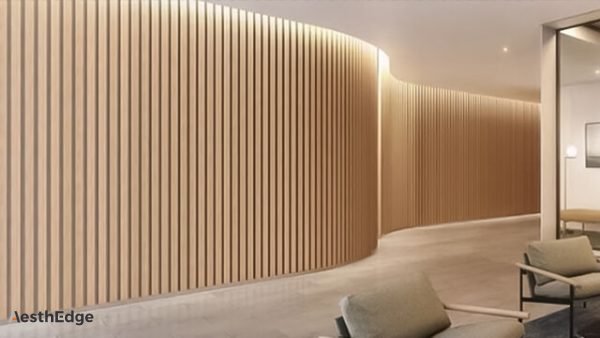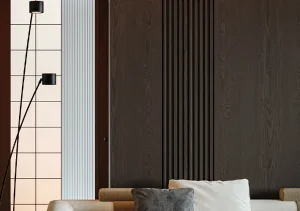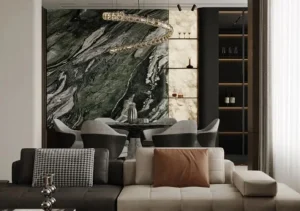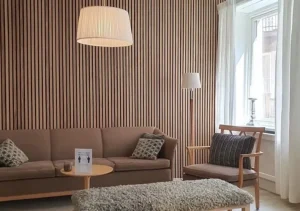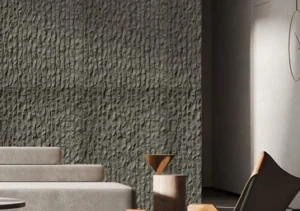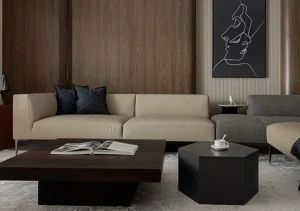Table of Contents
ToggleIntroduction
In modern hotel decoration, aesthetics, durability, and sustainability are key factors influencing material selection. Among the various decorative materials available, bamboo charcoal wood veneer has emerged as an excellent choice for hotels due to its eco-friendly properties, durability, and luxurious appearance. This article explores the benefits of using bamboo charcoal wood veneer in hotel decoration, detailing its features, applications, and advantages over traditional materials.

1. Eco-Friendliness and Sustainability
1.1 Environmentally Sustainable Material
Bamboo charcoal wood veneer is derived from bamboo, one of the fastest-growing plants in the world. Unlike traditional wood veneer sourced from slow-growing hardwoods, bamboo can be harvested within 3–5 years, making it a highly renewable resource. This helps in reducing deforestation and promoting sustainable construction practices in the hospitality industry.
Additionally, the production of bamboo charcoal wood veneer requires less water and fewer chemicals compared to traditional wood veneer manufacturing. This further reduces environmental impact and ensures a cleaner, more sustainable production process.
1.2 Carbon Sequestration and Air Purification
One of the unique advantages of bamboo charcoal wood veneer is its ability to absorb carbon dioxide and purify indoor air. Bamboo charcoal has porous properties, which enable it to absorb harmful substances such as formaldehyde, benzene, and ammonia, thereby improving indoor air quality in hotel rooms, lobbies, and other areas.
Furthermore, bamboo charcoal naturally regulates humidity by absorbing excess moisture in humid conditions and releasing it when the air is dry. This feature helps maintain a comfortable indoor environment for hotel guests.
1.3 Low Carbon Footprint
Compared to traditional hardwood panels, the production process of bamboo charcoal wood veneer has a significantly lower carbon footprint. Bamboo cultivation requires minimal fertilizers and pesticides, making it an eco-friendly alternative for hoteliers who aim to promote green building practices.
Moreover, the manufacturing process generates less waste, as almost every part of the bamboo plant can be utilized, including its fibers, roots, and charcoal. This makes bamboo charcoal wood veneer one of the most efficient and sustainable materials in hotel decoration.
2. Aesthetic Appeal and Versatility
2.1 Luxurious and Natural Appearance
Bamboo charcoal wood veneer provides a rich, natural grain pattern that enhances the luxurious appeal of hotel interiors. Available in a variety of textures, finishes, and colors, it can be customized to match different design themes, whether modern, contemporary, or traditional.
Advanced processing technologies allow bamboo charcoal wood veneer to mimic the appearance of premium hardwoods such as oak, walnut, and mahogany, providing the same elegance at a more affordable price. This makes it an ideal choice for high-end hotels looking to balance aesthetics and cost-efficiency.
2.2 Wide Range of Applications
Bamboo charcoal wood veneer is versatile and can be used in various hotel spaces, including:
- Wall Panels: Adds a sophisticated and warm ambiance to lobbies, guest rooms, and conference halls.
- Ceilings: Enhances acoustics and aesthetics while maintaining a natural look.
- Furniture: Ideal for hotel furniture like reception desks, tables, and wardrobes due to its durability and elegance.
- Doors and Partitions: Provides a sleek and modern touch while offering better sound insulation.
- Bathrooms: With moisture-resistant properties, it is an excellent choice for spa and wellness areas.
- Headboards and Accent Walls: Enhances the comfort and style of hotel guest rooms, creating a more inviting atmosphere.

3. Durability and Performance
3.1 High Strength and Longevity
Bamboo charcoal wood veneer is known for its high tensile strength and durability, making it ideal for high-traffic areas in hotels. Unlike traditional wood, it is less prone to cracking, warping, or termite damage, ensuring long-term performance.
The natural structure of bamboo fibers gives it superior strength, making it more resistant to impact than conventional wooden surfaces. This durability ensures that hotel interiors maintain their pristine appearance for years, reducing maintenance costs.
3.2 Moisture and Mold Resistance
The bamboo charcoal treatment enhances the veneer’s moisture resistance, making it less susceptible to swelling or mold growth. This is especially beneficial in humid regions where hotels require materials that can withstand fluctuating humidity levels.
Additionally, bamboo charcoal’s antimicrobial properties inhibit the growth of bacteria and mold, ensuring a cleaner and healthier environment for guests. This makes it particularly suitable for hotel bathrooms, kitchens, and wellness areas.
3.3 Fire-Resistant Properties
Many bamboo charcoal wood veneer products come with fire-retardant coatings, increasing hotel safety by slowing down the spread of flames in case of fire hazards.
Fire safety is a critical concern in the hospitality industry, and using materials like bamboo charcoal wood veneer can help hotels comply with fire safety regulations while maintaining elegant interiors.

4. Sound Absorption and Acoustic Benefits
Hotels require soundproofing solutions to ensure guest comfort, especially in lobbies, conference rooms, and guest suites. Bamboo charcoal wood veneer has natural sound-absorbing properties, reducing noise pollution and enhancing privacy. Its micro-porous structure helps in diffusing sound waves, making it an excellent material for:
- Luxury hotel rooms that need a quiet and relaxing ambiance.
- Conference halls requiring clear sound acoustics.
- Entertainment lounges where noise control is essential.
Compared to traditional wood panels, bamboo charcoal wood veneer can reduce noise transmission by up to 30%, significantly improving the overall guest experience.
5. Cost-Effectiveness and Easy Maintenance
5.1 Affordable Alternative to Hardwood Veneer
Compared to premium hardwoods like oak or teak, bamboo charcoal wood veneer is more cost-effective while maintaining the same level of elegance and durability. This makes it an attractive option for hoteliers seeking high-quality materials at a reasonable price.
5.2 Easy Cleaning and Maintenance
The smooth surface of bamboo charcoal wood veneer makes it easy to clean and maintain. It requires only regular wiping with a damp cloth, and its resistance to stains and scratches ensures a long-lasting pristine appearance.
Additionally, it does not require frequent polishing or refinishing, further reducing maintenance costs over time.
5.3 Long-Term Cost Savings
Due to its durability, resistance to moisture, and low maintenance requirements, hotels can save significantly on repair and replacement costs, making bamboo charcoal wood veneer a smart investment for long-term use.

6. Market Trends and Future Prospects
6.1 Growing Demand for Eco-Friendly Materials
With the increasing emphasis on sustainable hospitality, more hotels are integrating eco-friendly and non-toxic materials into their interiors. Bamboo charcoal wood veneer is expected to see a rising demand as hotels strive to meet green building standards.
6.2 Customization and Technological Advancements
Manufacturers are continuously improving bamboo charcoal wood veneer by introducing customized finishes, enhanced textures, and digital printing options to cater to diverse hotel design preferences.
6.3 Expansion in the Luxury Hospitality Sector
Luxury hotels and resorts are increasingly adopting bamboo charcoal wood veneer for its premium appeal and functional benefits. Its ability to enhance the guest experience through improved air quality, aesthetics, and comfort makes it a preferred choice for high-end establishments.
Conclusion
Bamboo charcoal wood veneer is an innovative and sustainable material that offers multiple benefits for hotel decoration. Its eco-friendliness, durability, aesthetic versatility, sound absorption, and cost-effectiveness make it an ideal choice for hoteliers aiming to create a luxurious yet sustainable environment.
By incorporating this material into hotel decoration, businesses can enhance their brand image, attract eco-conscious guests, and contribute to a healthier and more sustainable hospitality industry.

